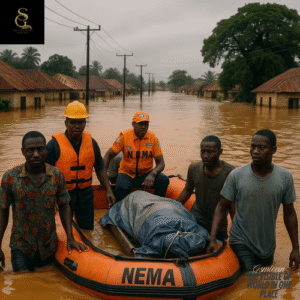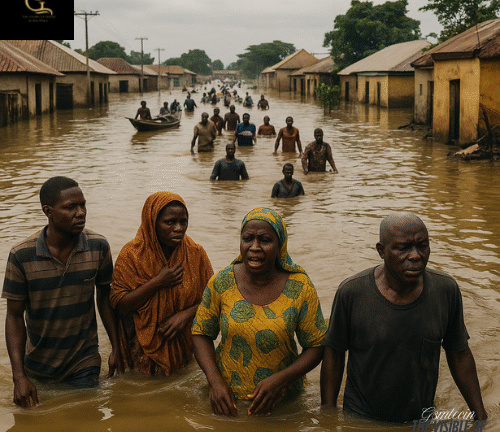Nigeria Floods Kill More Than 200 as Crisis Deepens Nationwide.
More than 200 people have died in Nigeria’s disastrous floods, which authorities call one of the worst in recent memory. Communities in over 30 of the nation’s 36 states have been severely damaged by torrential rains. These began in early July and grew more intense through August and September. The ensuing devastation has destroyed important infrastructure and displaced hundreds of thousands.
Entire towns have been flooded, from Lagos in the southwest to Kogi and Benue in the centre, and down to Bayelsa and Anambra in the southeast. Bridges have collapsed, homes have vanished underwater, and roads have turned into rivers. Farmlands the backbone of many rural communities have been wiped out. In some areas, flooding is so severe that only rooftops remain visible, forcing residents to use improvised boats to escape.
The Ministry of Humanitarian Affairs and Disaster Management in Nigeria says over half a million people have fled their homes. The government says more than 200 people have died. With many still unaccounted for, officials warn the death toll could rise further.
Niger State’s centre town of Mokwa is among the most severely affected areas. Following Thursday’s devastating floods, officials there report that the death toll has sharply increased. About 500 individuals are still unaccounted for, and at least 200 people have died. Local authorities feel there is no chance of finding anyone alive, thus the hunt for survivors has officially ceased.
Musa Kimboku, deputy chairman of Mokwa Local Government, told the BBC that search and rescue teams had to suspend operations due to extensive damage and a lack of new leads. Muhammadu Aliyu, the district head of Mokwa, said they would begin excavating bodies buried in the mud to prevent disease outbreaks.
Residents of towns like Tiffin Maza and Anguwan Hausawa have described terrifying scenes of homes collapsing and neighbourhoods vanishing within minutes. Some families were swept away by rushing waves. Residents claim that these floods are the worst to hit the region in 60 years.
Although flooding is frequent throughout Nigeria’s rainy season, which usually lasts from April to October, this year’s catastrophe is especially bad. According to experts, the region’s rainfall has increased due to climate change. However, it is not the sole factor. Environmental scientists and officials have also blamed water from the Lagdo Dam in neighbouring Cameroon. When the dam opens, excess water flows into the Benue River in Nigeria and merges with other major rivers in central and southern Nigeria.
Authorities plan to build a parallel dam, Dasin Hausa, in Adamawa State to manage overflow from the Lagdo Dam. However, that project is still unfinished decades later, and Nigeria experiences severe floods every time Cameroon opens its dam.
Uncontrolled urban growth is another problem. Natural drainage systems have been obstructed by building in numerous cities. When coupled with inadequate infrastructure, rainfall becomes a hazardous floodwater accumulation that is unmanageable by cities.
Through the National Emergency Management Agency, or NEMA, the Nigerian government has initiated disaster relief efforts in response to the national emergency. Displacement camps are receiving relief goods, such as food, bedding, medication, and makeshift shelters. On Sunday, the agency announced that it is preparing relief packages for people in Mokwa and nearby towns.
However, the difficulties are becoming more severe. Officials reported that raging waters washed away many roads and bridges, making it more difficult to reach people who need help. In a statement issued on Friday, the Nigerian Red Cross said the tragedy was resulting in “significant loss of life and widespread distress.”
Sadiya Umar Farouq, the Minister of Humanitarian Affairs, visited a number of affected areas in the interim. She publicly called for foreign help, acknowledging that the crisis had surpassed local resources. She said, “We need much more support,” and added that they are coordinating with the Red Cross and United Nations agencies.
Agriculture has also been negatively impacted by the water. Food security in the upcoming months is at risk due to the submersion of farmlands in central and southern Nigeria. Analysts warn of rising inflation and famine as food prices continue to climb.
Health issues are also becoming more prevalent. Waterborne illnesses including cholera, typhoid, and malaria have found ideal habitats in stagnant floodwaters. Particularly for congested displacement camps with limited access to clean water and sanitary facilities, public health professionals are raising the alarm.
Abuja doctor Dr. Ifeanyi Okeke cautioned that a subsequent catastrophe might arise from the flood’s aftermath. “The immediate disaster is devastating, but the long-term displacement, hunger, and disease outbreaks that follow could be just as deadly,” he warned.
Particularly at risk are children, the elderly, and people with impairments. Thousands of pupils now lack access to instruction because authorities have converted schools into makeshift shelters.
Demands for long-term solutions have increased in response to Nigeria’s increasing extreme floods frequency. It clearly shows who is acting (environmentalists) and what actions they want (pressure the government to improve systems).

According to Nigerian climate activist Nnimmo Bassey, “there is a pattern to this.” Almost every year, we witness devastating flooding, yet there isn’t a unified national plan to stop it. We urgently require more robust institutions and climate adaption.
Additionally, lawmakers are voicing their opinions and advocating for a national flood response framework that incorporates improved emergency planning and early warning systems.
But for the time being, survival is still the major priority. Families like Aisha Ibrahim’s are attempting to make sense of the destruction in temporary shelters spread out across the nation. She is a Benue State mother of four who currently resides in a makeshift camp with her kids. She claimed, “We lost everything, including our farm, our house, and even our animals.” “All we want is to live and start over.“
Officials warn that additional storms could approach as the rainy season is expected to last until October. It may take weeks to understand the full effects of this year’s floods, but one thing is certain: this disaster already ranks among the worst to hit Nigeria in decades.





